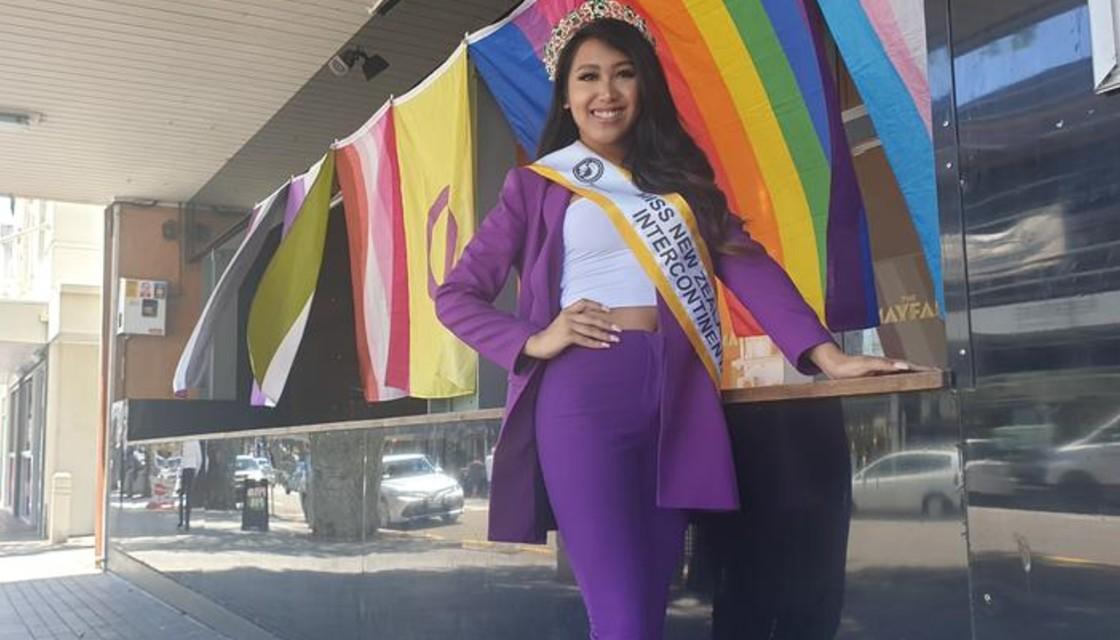
Aotearoa's first transgender Miss New Zealand contestant was the star turn at another first on Friday - the first transgender awareness event held in New Plymouth.
Arielle Keil made history this month when she won the title of Miss Intercontinental New Zealand.
She says growing up was difficult.
"I didn't really have the tools or the or knowledge to, like, I guess understand what being transgender was.
"All I knew was that I was a feminine soul and a feminine being and that didn't necessarily sit well with me in terms of the body I was born in."
The 26-year-old said the internal conflict often made her physically sick, a feeling that didn't change until she made the decision to transition.
The beauty pageant winner, who was originally from the Philippines, knew sharing her experience would help others.
"I feel like growing up that if I had someone like me to look up to or to talk to it would've helped me a lot because I didn't have any like trans representation especially in New Zealand growing up and so for me being trans was like a negative thing."
On Friday, she was one of many who shared their stories as part of The Transgender Day of Celebration, the brainchild of Sunita Torrance of Flash Mob Entertainment.
Torrance said she wanted to bust myths about the transgender community and give them more visibility.
"We have these amazing people in our community. They are doing amazing things in our community. They're normal people, there's no superhuman strength with them or anything weird going on. They are just members of our community and some of their stories are really interesting as well."

The event featured presentations from Rainbow Youth, workshops and a social event.
Torrance said there was also a living library of people happy to share their experience of transitioning.
"It's a good opportunity for people to ask questions about them, get more insight without the feeling of offending them.
"People feel like 'oh I don't know how to word this question'. Just say it. These people will understand that. They will use it as a way to educate as well and if it is an offensive way to say it they'll teach you the right way to say it."
Chemical engineer Phyllis King - who was one of the living books - admitted to suppressing feelings about her identity for years.
"I didn't know from a very young age whether I preferred male or female. I functioned as a male. I built motorised trolleys and fireworks and all that sort of thing. All good fun.
"And if I did have female leanings - we're talking 1950s and '60s - you suppressed them."
Married for 36 years, it was only after the death of Phyllis' wife that she felt comfortable to pursue transitioning, initially through self medicating.
Now, she could not be more comfortable with her identity.
"I am a gender reassigned, surgically modified transsexual. I use that old fashioned word because I am old and that means more to me than just a transgender person."
Listening intently to these experiences with her mother Natasha was 16-year-old Jaylene Louw.
She had already hit rock bottom.
"I wouldn't leave my bed, I wouldn't leave the house. I got really sick and then I was kinda, like, at this point it's like life or death I've got to decide if I'm going to continue my life this way or be happy.
"And so I chose, obviously, the better option and got in contact with a doctor and started estrogen about 23 days ago and it's feeling a lot better now."

Jaylene reckoned events like Friday's were helpful.
"Yeah definitely, it's like you know you're going to get some discrimination and hate in some places but that doesn't really matter as long as you know where you are coming from and how you feel.
"That's probably the best part, just accepting yourself and you get to not care about what other people say."
It was important for mum Natasha too.
"It was mostly for me to understand a bit more because it has all happened recently, but also for Jaylene to see that there is help, there's that 'accept them the way they are' and I mean that's all a mum wants."
Her advice to parents in a similar situation was to go with the flow and let their children be who they wanted to be.
She said the alternative did not bear contemplating.
RNZ


